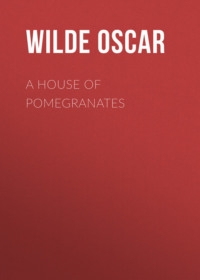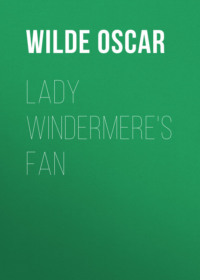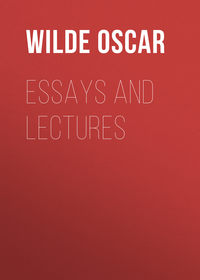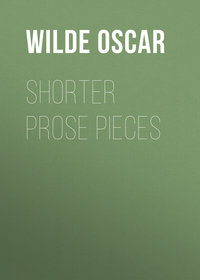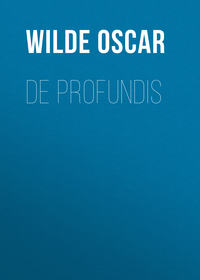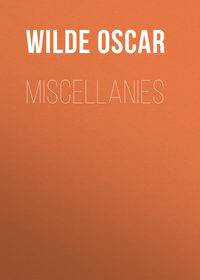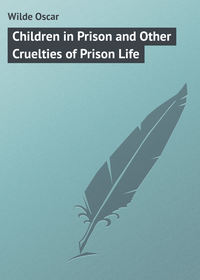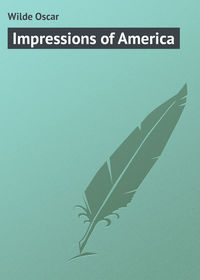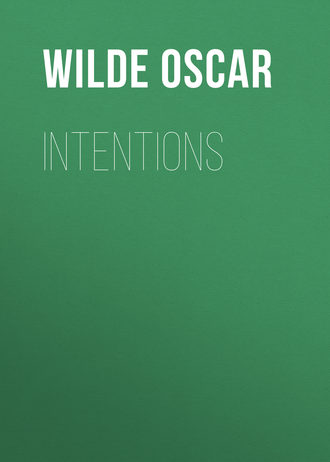 полная версия
полная версияIntentions
Before this, however, he seems to have been carried away by boyish dreams of the romance and chivalry of a soldier’s life, and to have become a young guardsman. But the reckless dissipated life of his companions failed to satisfy the refined artistic temperament of one who was made for other things. In a short time he wearied of the service. ‘Art,’ he tells us, in words that still move many by their ardent sincerity and strange fervour, ‘Art touched her renegade; by her pure and high influence the noisome mists were purged; my feelings, parched, hot, and tarnished, were renovated with cool, fresh bloom, simple, beautiful to the simple-hearted.’ But Art was not the only cause of the change. ‘The writings of Wordsworth,’ he goes on to say, ‘did much towards calming the confusing whirl necessarily incident to sudden mutations. I wept over them tears of happiness and gratitude.’ He accordingly left the army, with its rough barrack-life and coarse mess-room tittle-tattle, and returned to Linden House, full of this new-born enthusiasm for culture. A severe illness, in which, to use his own words, he was ‘broken like a vessel of clay,’ prostrated him for a time. His delicately strung organisation, however indifferent it might have been to inflicting pain on others, was itself most keenly sensitive to pain. He shrank from suffering as a thing that mars and maims human life, and seems to have wandered through that terrible valley of melancholia from which so many great, perhaps greater, spirits have never emerged. But he was young – only twenty-five years of age – and he soon passed out of the ‘dead black waters,’ as he called them, into the larger air of humanistic culture. As he was recovering from the illness that had led him almost to the gates of death, he conceived the idea of taking up literature as an art. ‘I said with John Woodvil,’ he cries, ‘it were a life of gods to dwell in such an element,’ to see and hear and write brave things: —
‘These high and gusty relishes of lifeHave no allayings of mortality.’It is impossible not to feel that in this passage we have the utterance of a man who had a true passion for letters. ‘To see and hear and write brave things,’ this was his aim.
Scott, the editor of the London Magazine, struck by the young man’s genius, or under the influence of the strange fascination that he exercised on every one who knew him, invited him to write a series of articles on artistic subjects, and under a series of fanciful pseudonym he began to contribute to the literature of his day. Janus Weathercock, Egomet Bonmot, and Van Vinkvooms, were some of the grotesque masks under which he choose to hide his seriousness or to reveal his levity. A mask tells us more than a face. These disguises intensified his personality. In an incredibly short time he seems to have made his mark. Charles Lamb speaks of ‘kind, light-hearted Wainewright,’ whose prose is ‘capital.’ We hear of him entertaining Macready, John Forster, Maginn, Talfourd, Sir Wentworth Dilke, the poet John Clare, and others, at a petit-dîner. Like Disraeli, he determined to startle the town as a dandy, and his beautiful rings, his antique cameo breast-pin, and his pale lemon-coloured kid gloves, were well known, and indeed were regarded by Hazlitt as being the signs of a new manner in literature: while his rich curly hair, fine eyes, and exquisite white hands gave him the dangerous and delightful distinction of being different from others. There was something in him of Balzac’s Lucien de Rubempré. At times he reminds us of Julien Sorel. De Quincey saw him once. It was at a dinner at Charles Lamb’s. ‘Amongst the company, all literary men, sat a murderer,’ he tells us, and he goes on to describe how on that day he had been ill, and had hated the face of man and woman, and yet found himself looking with intellectual interest across the table at the young writer beneath whose affectations of manner there seemed to him to lie so much unaffected sensibility, and speculates on ‘what sudden growth of another interest’ would have changed his mood, had he known of what terrible sin the guest to whom Lamb paid so much attention was even then guilty.
His life-work falls naturally under the three heads suggested by Mr. Swinburne, and it may be partly admitted that, if we set aside his achievements in the sphere of poison, what he has actually left to us hardly justifies his reputation.
But then it is only the Philistine who seeks to estimate a personality by the vulgar test of production. This young dandy sought to be somebody, rather than to do something. He recognised that Life itself is in art, and has its modes of style no less than the arts that seek to express it. Nor is his work without interest. We hear of William Blake stopping in the Royal Academy before one of his pictures and pronouncing it to be ‘very fine.’ His essays are prefiguring of much that has since been realised. He seems to have anticipated some of those accidents of modern culture that are regarded by many as true essentials. He writes about La Gioconda, and early French poets and the Italian Renaissance. He loves Greek gems, and Persian carpets, and Elizabethan translations of Cupid and Psyche, and the Hypnerotomachia, and book-binding and early editions, and wide-margined proofs. He is keenly sensitive to the value of beautiful surroundings, and never wearies of describing to us the rooms in which he lived, or would have liked to live. He had that curious love of green, which in individuals is always the sign of a subtle artistic temperament, and in nations is said to denote a laxity, if not a decadence of morals. Like Baudelaire he was extremely fond of cats, and with Gautier, he was fascinated by that ‘sweet marble monster’ of both sexes that we can still see at Florence and in the Louvre.
There is of course much in his descriptions, and his suggestions for decoration, that shows that he did not entirely free himself from the false taste of his time. But it is clear that he was one of the first to recognise what is, indeed, the very keynote of æsthetic eclecticism, I mean the true harmony of all really beautiful things irrespective of age or place, of school or manner. He saw that in decorating a room, which is to be, not a room for show, but a room to live in, we should never aim at any archæological reconstruction of the past, nor burden ourselves with any fanciful necessity for historical accuracy. In this artistic perception he was perfectly right. All beautiful things belong to the same age.
And so, in his own library, as he describes it, we find the delicate fictile vase of the Greek, with its exquisitely painted figures and the faint ΚΑΛΟΣ finely traced upon its side, and behind it hangs an engraving of the ‘Delphic Sibyl’ of Michael Angelo, or of the ‘Pastoral’ of Giorgione. Here is a bit of Florentine majolica, and here a rude lamp from some old Roman tomb. On the table lies a book of Hours, ‘cased in a cover of solid silver gilt, wrought with quaint devices and studded with small brilliants and rubies,’ and close by it ‘squats a little ugly monster, a Lar, perhaps, dug up in the sunny fields of corn-bearing Sicily.’ Some dark antique bronzes contrast with the pale gleam of two noble Christi Crucifixi, one carved in ivory, the other moulded in wax.’ He has his trays of Tassie’s gems, his tiny Louis-Quatorze bonbonnière with a miniature by Petitot, his highly prized ‘brown-biscuit teapots, filagree-worked,’ his citron morocco letter-case, and his ‘pomona-green’ chair.
One can fancy him lying there in the midst of his books and casts and engravings, a true virtuoso, a subtle connoisseur, turning over his fine collection of Mare Antonios, and his Turner’s ‘Liber Studiorum,’ of which he was a warm admirer, or examining with a magnifier some of his antique gems and cameos, ‘the head of Alexander on an onyx of two strata,’ or ‘that superb altissimo relievo on cornelian, Jupiter Ægiochus.’ He was always a great amateur of engravings, and gives some very useful suggestions as to the best means of forming a collection. Indeed, while fully appreciating modern art, he never lost sight of the importance of reproductions of the great masterpieces of the past, and all that he says about the value of plaster casts is quite admirable.
As an art-critic he concerned himself primarily with the complex impressions produced by a work of art, and certainly the first step in æsthetic criticism is to realise one’s own impressions. He cared nothing for abstract discussions on the nature of the Beautiful, and the historical method, which has since yielded such rich fruit, did not belong to his day, but he never lost sight of the great truth that Art’s first appeal is neither to the intellect nor to the emotions, but purely to the artistic temperament, and he more than once points out that this temperament, this ‘taste,’ as he calls it, being unconsciously guided and made perfect by frequent contact with the best work, becomes in the end a form of right judgment. Of course there are fashions in art just as there are fashions in dress, and perhaps none of us can ever quite free ourselves from the influence of custom and the influence of novelty. He certainly could not, and he frankly acknowledges how difficult it is to form any fair estimate of contemporary work. But, on the whole, his taste was good and sound. He admired Turner and Constable at a time when they were not so much thought of as they are now, and saw that for the highest landscape art we require more than ‘mere industry and accurate transcription.’ Of Crome’s ‘Heath Scene near Norwich’ he remarks that it shows ‘how much a subtle observation of the elements, in their wild moods, does for a most uninteresting flat,’ and of the popular type of landscape of his day he says that it is ‘simply an enumeration of hill and dale, stumps of trees, shrubs, water, meadows, cottages and houses; little more than topography, a kind of pictorial map-work; in which rainbows, showers, mists, haloes, large beams shooting through rifted clouds, storms, starlight, all the most valued materials of the real painter, are not.’ He had a thorough dislike of what is obvious or commonplace in art, and while he was charmed to entertain Wilkie at dinner, he cared as little for Sir David’s pictures as he did for Mr. Crabbe’s poems. With the imitative and realistic tendencies of his day he had no sympathy and he tells us frankly that his great admiration for Fuseli was largely due to the fact that the little Swiss did not consider it necessary that an artist should paint only what he sees. The qualities that he sought for in a picture were composition, beauty and dignity of line, richness of colour, and imaginative power. Upon the other hand, he was not a doctrinaire. ‘I hold that no work of art can be tried otherwise than by laws deduced from itself: whether or not it be consistent with itself is the question.’ This is one of his excellent aphorisms. And in criticising painters so different as Landseer and Martin, Stothard and Etty, he shows that, to use a phrase now classical, he is trying ‘to see the object as in itself it really is.’
However, as I pointed out before, he never feels quite at his ease in his criticisms of contemporary work. ‘The present,’ he says, ‘is about as agreeable a confusion to me as Ariosto on the first perusal… Modern things dazzle me. I must look at them through Time’s telescope. Elia complains that to him the merit of a MS. poem is uncertain; “print,” as he excellently says, “settles it.” Fifty years’ toning does the same thing to a picture.’ He is happier when he is writing about Watteau and Lancret, about Rubens and Giorgione, about Rembrandt, Corregio, and Michael Angelo; happiest of all when he is writing about Greek things. What is Gothic touched him very little, but classical art and the art of the Renaissance were always dear to him. He saw what our English school could gain from a study of Greek models, and never wearies of pointing out to the young student the artistic possibilities that lie dormant in Hellenic marbles and Hellenic methods of work. In his judgments on the great Italian Masters, says De Quincey, ‘there seemed a tone of sincerity and of native sensibility, as in one who spoke for himself, and was not merely a copier from books.’ The highest praise that we can give to him is that he tried to revive style as a conscious tradition. But he saw that no amount of art lectures or art congresses, or ‘plans for advancing the fine arts,’ will ever produce this result. The people, he says very wisely, and in the true spirit of Toynbee Hall, must always have ‘the best models constantly before their eyes.’
As is to be expected from one who was a painter, he is often extremely technical in his art criticisms. Of Tintoret’s ‘St. George delivering the Egyptian Princess from the Dragon,’ he remarks: —
The robe of Sabra, warmly glazed with Prussian blue, is relieved from the pale greenish background by a vermilion scarf; and the full hues of both are beautifully echoed, as it were, in a lower key by the purple-lake coloured stuffs and bluish iron armour of the saint, besides an ample balance to the vivid azure drapery on the foreground in the indigo shades of the wild wood surrounding the castle.
And elsewhere he talks learnedly of ‘a delicate Schiavone, various as a tulip-bed, with rich broken tints,’ of ‘a glowing portrait, remarkable for morbidezza, by the scarce Moroni,’ and of another picture being ‘pulpy in the carnations.’
But, as a rule, he deals with his impressions of the work as an artistic whole, and tries to translate those impressions into words, to give, as it were, the literary equivalent for the imaginative and mental effect. He was one of the first to develop what has been called the art-literature of the nineteenth century, that form of literature which has found in Mr. Ruskin and Mr. Browning, its two most perfect exponents. His description of Lancret’s Repas Italien, in which ‘a dark-haired girl, “amorous of mischief,” lies on the daisy-powdered grass,’ is in some respects very charming. Here is his account of ‘The Crucifixion,’ by Rembrandt. It is extremely characteristic of his style —
Darkness – sooty, portentous darkness – shrouds the whole scene: only above the accursed wood, as if through a horrid rift in the murky ceiling, a rainy deluge – ‘sleety-flaw, discoloured water’ – streams down amain, spreading a grisly spectral light, even more horrible than that palpable night. Already the Earth pants thick and fast! the darkened Cross trembles! the winds are dropt – the air is stagnant – a muttering rumble growls underneath their feet, and some of that miserable crowd begin to fly down the hill. The horses snuff the coming terror, and become unmanageable through fear. The moment rapidly approaches when, nearly torn asunder by His own weight, fainting with loss of blood, which now runs in narrower rivulets from His slit veins, His temples and breast drowned in sweat, and His black tongue parched with the fiery death-fever, Jesus cries, ‘I thirst.’ The deadly vinegar is elevated to Him.
His head sinks, and the sacred corpse ‘swings senseless of the cross.’ A sheet of vermilion flame shoots sheer through the air and vanishes; the rocks of Carmel and Lebanon cleave asunder; the sea rolls on high from the sands its black weltering waves. Earth yawns, and the graves give up their dwellers. The dead and the living are mingled together in unnatural conjunction and hurry through the holy city. New prodigies await them there. The veil of the temple – the unpierceable veil – is rent asunder from top to bottom, and that dreaded recess containing the Hebrew mysteries – the fatal ark with the tables and seven-branched candelabrum – is disclosed by the light of unearthly flames to the God-deserted multitude.
Rembrandt never painted this sketch, and he was quite right. It would have lost nearly all its charms in losing that perplexing veil of indistinctness which affords such ample range wherein the doubting imagination may speculate. At present it is like a thing in another world. A dark gulf is betwixt us. It is not tangible by the body. We can only approach it in the spirit.
In this passage, written, the author tells us, ‘in awe and reverence,’ there is much that is terrible, and very much that is quite horrible, but it is not without a certain crude form of power, or, at any rate, a certain crude violence of words, a quality which this age should highly appreciate, as it is its chief defect. It is pleasanter, however, to pass to this description of Giulio Romano’s ‘Cephalus and Procris’: —
We should read Moschus’s lament for Bion, the sweet shepherd, before looking at this picture, or study the picture as a preparation for the lament. We have nearly the same images in both. For either victim the high groves and forest dells murmur; the flowers exhale sad perfume from their buds; the nightingale mourns on the craggy lands, and the swallow in the long-winding vales; ‘the satyrs, too, and fauns dark-veiled groan,’ and the fountain nymphs within the wood melt into tearful waters. The sheep and goats leave their pasture; and oreads, ‘who love to scale the most inaccessible tops of all uprightest rocks,’ hurry down from the song of their wind-courting pines; while the dryads bend from the branches of the meeting trees, and the rivers moan for white Procris, ‘with many-sobbing streams,’
Filling the far-seen ocean with a voiceThe golden bees are silent on the thymy Hymettus; and the knelling horn of Aurora’s love no more shall scatter away the cold twilight on the top of Hymettus. The foreground of our subject is a grassy sunburnt bank, broken into swells and hollows like waves (a sort of land-breakers), rendered more uneven by many foot-tripping roots and stumps of trees stocked untimely by the axe, which are again throwing out light-green shoots. This bank rises rather suddenly on the right to a clustering grove, penetrable to no star, at the entrance of which sits the stunned Thessalian king, holding between his knees that ivory-bright body which was, but an instant agone, parting the rough boughs with her smooth forehead, and treading alike on thorns and flowers with jealousy-stung foot – now helpless, heavy, void of all motion, save when the breeze lifts her thick hair in mockery.
From between the closely-neighboured boles astonished nymphs press forward with loud cries —
And deerskin-vested satyrs, crowned with ivy twists, advance;
And put strange pity in their horned countenance.
Laelaps lies beneath, and shows by his panting the rapid pace of death. On the other side of the group, Virtuous Love with ‘vans dejected’ holds forth the arrow to an approaching troop of sylvan people, fauns, rams, goats, satyrs, and satyr-mothers, pressing their children tighter with their fearful hands, who hurry along from the left in a sunken path between the foreground and a rocky wall, on whose lowest ridge a brook-guardian pours from her urn her grief-telling waters. Above and more remote than the Ephidryad, another female, rending her locks, appears among the vine-festooned pillars of an unshorn grove. The centre of the picture is filled by shady meadows, sinking down to a river-mouth; beyond is ‘the vast strength of the ocean stream,’ from whose floor the extinguisher of stars, rosy Aurora, drives furiously up her brine-washed steeds to behold the death-pangs of her rival.
Were this description carefully re-written, it would be quite admirable. The conception of making a prose poem out of paint is excellent. Much of the best modern literature springs from the same aim. In a very ugly and sensible age, the arts borrow, not from life, but from each other.
His sympathies, too, were wonderfully varied. In everything connected with the stage, for instance, he was always extremely interested, and strongly upheld the necessity for archæological accuracy in costume and scene-painting. ‘In art,’ he says in one of his essays, ‘whatever is worth doing at all is worth doing well’; and he points out that once we allow the intrusion of anachronisms, it becomes difficult to say where the line is to be drawn. In literature, again, like Lord Beaconsfield on a famous occasion, he was ‘on the side of the angels.’ He was one of the first to admire Keats and Shelley – ‘the tremulously-sensitive and poetical Shelley,’ as he calls him. His admiration for Wordsworth was sincere and profound. He thoroughly appreciated William Blake. One of the best copies of the ‘Songs of Innocence and Experience’ that is now in existence was wrought specially for him. He loved Alain Chartier, and Ronsard, and the Elizabethan dramatists, and Chaucer and Chapman, and Petrarch. And to him all the arts were one. ‘Our critics,’ he remarks with much wisdom, ‘seem hardly aware of the identity of the primal seeds of poetry and painting, nor that any true advancement in the serious study of one art co-generates a proportionate perfection in the other’; and he says elsewhere that if a man who does not admire Michael Angelo talks of his love for Milton, he is deceiving either himself or his listeners. To his fellow-contributors in the London Magazine he was always most generous, and praises Barry Cornwall, Allan Cunningham, Hazlitt, Elton, and Leigh Hunt without anything of the malice of a friend. Some of his sketches of Charles Lamb are admirable in their way, and, with the art of the true comedian, borrow their style from their subject: —
What can I say of thee more than all know? that thou hadst the gaiety of a boy with the knowledge of a man: as gentle a heart as ever sent tears to the eyes.
How wittily would he mistake your meaning, and put in a conceit most seasonably out of season. His talk without affectation was compressed, like his beloved Elizabethans, even unto obscurity. Like grains of fine gold, his sentences would beat out into whole sheets. He had small mercy on spurious fame, and a caustic observation on the fashion for men of genius was a standing dish. Sir Thomas Browne was a ‘bosom cronie’ of his; so was Burton, and old Fuller. In his amorous vein he dallied with that peerless Duchess of many-folio odour; and with the heyday comedies of Beaumont and Fletcher he induced light dreams. He would deliver critical touches on these, like one inspired, but it was good to let him choose his own game; if another began even on the acknowledged pets he was liable to interrupt, or rather append, in a mode difficult to define whether as misapprehensive or mischievous. One night at C-’s, the above dramatic partners were the temporary subject of chat. Mr. X. commended the passion and haughty style of a tragedy (I don’t know which of them), but was instantly taken up by Elia, who told him ‘That was nothing; the lyrics were the high things – the lyrics!’
One side of his literary career deserves especial notice. Modern journalism may be said to owe almost as much to him as to any man of the early part of this century. He was the pioneer of Asiatic prose, and delighted in pictorial epithets and pompous exaggerations. To have a style so gorgeous that it conceals the subject is one of the highest achievements of an important and much admired school of Fleet Street leader-writers, and this school Janus Weathercock may be said to have invented. He also saw that it was quite easy by continued reiteration to make the public interested in his own personality, and in his purely journalistic articles this extraordinary young man tells the world what he had for dinner, where he gets his clothes, what wines he likes, and in what state of health he is, just as if he were writing weekly notes for some popular newspaper of our own time. This being the least valuable side of his work, is the one that has had the most obvious influence. A publicist, nowadays, is a man who bores the community with the details of the illegalities of his private life.
Like most artificial people, he had a great love of nature. ‘I hold three things in high estimation,’ he says somewhere: ‘to sit lazily on an eminence that commands a rich prospect; to be shadowed by thick trees while the sun shines around me; and to enjoy solitude with the consciousness of neighbourhood. The country gives them all to me.’ He writes about his wandering over fragrant furze and heath repeating Collins’s ‘Ode to Evening,’ just to catch the fine quality of the moment; about smothering his face ‘in a watery bed of cowslips, wet with May dews’; and about the pleasure of seeing the sweet-breathed kine ‘pass slowly homeward through the twilight,’ and hearing ‘the distant clank of the sheep-bell.’ One phrase of his, ‘the polyanthus glowed in its cold bed of earth, like a solitary picture of Giorgione on a dark oaken panel,’ is curiously characteristic of his temperament, and this passage is rather pretty in its way: —


